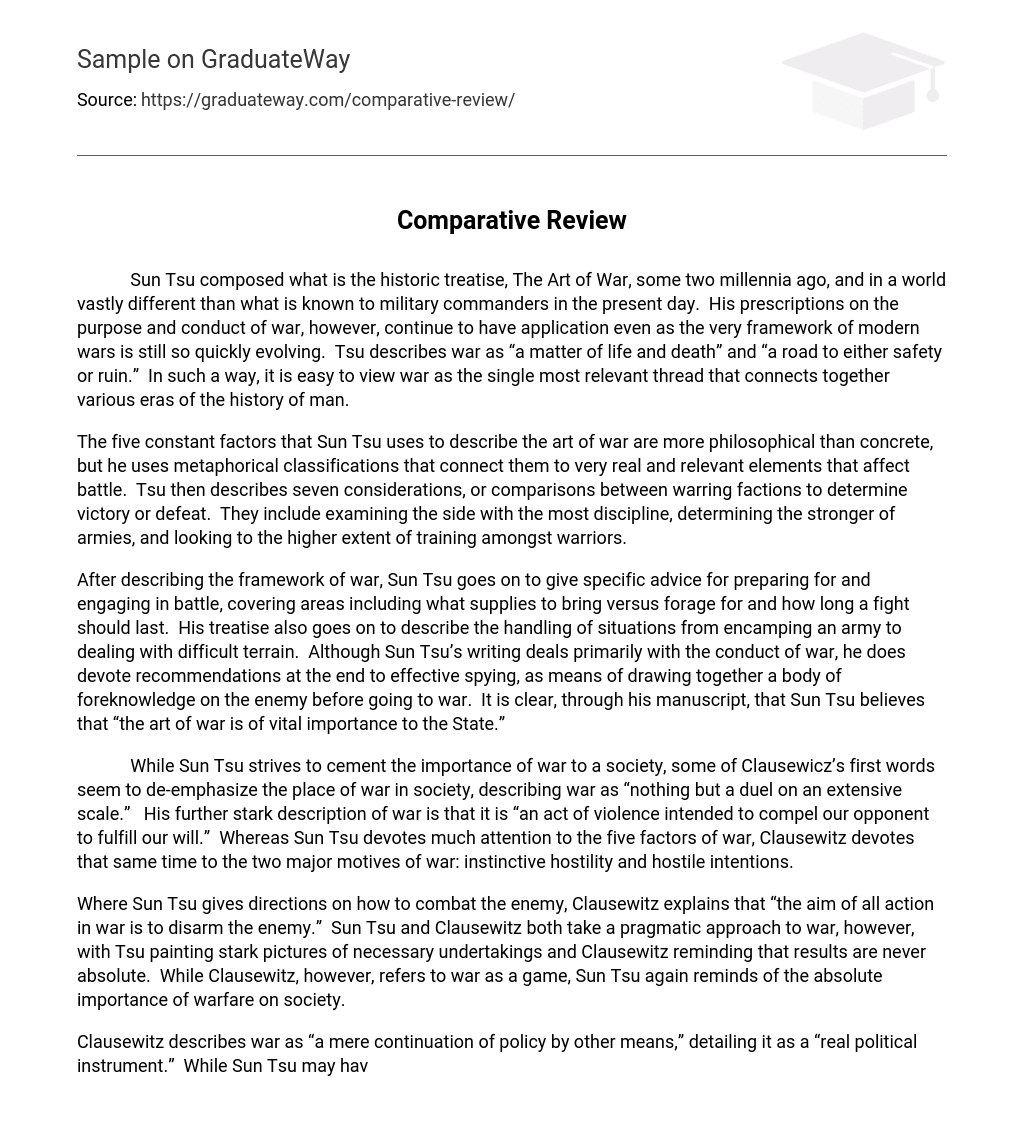Sun Tsu composed what is now considered a historic treatise, The Art of War, some two millennia ago. Even though the world has changed vastly since then, his prescriptions on the purpose and conduct of war continue to have relevance. Despite the fact that modern wars are evolving quickly, Tsu’s descriptions of war as a matter of life and death” and “a road to either safety or ruin” still hold true. It is easy to view war as the most relevant thread that connects various eras in human history.
The art of war, as described by Sun Tsu, is based on five constant factors that are more philosophical than concrete. However, Tsu uses metaphorical classifications that connect them to real and relevant elements that affect battle. In addition to these factors, Tsu also describes seven considerations or comparisons between warring factions to determine victory or defeat. These include examining the side with the most discipline, determining which army is stronger, and looking at the extent of training amongst warriors.
After describing the framework of war, Sun Tsu provides specific advice for preparing and engaging in battle. This includes what supplies to bring versus forage for, as well as how long a fight should last. His treatise also covers handling situations such as encamping an army and dealing with difficult terrain.
Although Sun Tsu’s writing primarily deals with the conduct of war, he does devote recommendations at the end to effective spying. This is seen as a means of gathering foreknowledge on the enemy before going to war. Through his manuscript, it is clear that Sun Tsu believes that the art of war is of vital importance to the State.
While Sun Tsu emphasizes the importance of war in society, some of Clausewicz’s first words seem to de-emphasize it. He describes war as “nothing but a duel on an extensive scale” and further states that it is “an act of violence intended to compel our opponent to fulfill our will.” Sun Tsu devotes much attention to the five factors of war, while Clausewitz focuses on the two major motives: instinctive hostility and hostile intentions.
According to Sun Tsu, combatting the enemy requires specific directions. On the other hand, Clausewitz states that the ultimate goal of any action in war is to disarm the enemy. Both authors take a pragmatic approach towards warfare. Sun Tsu paints stark pictures of necessary undertakings while Clausewitz reminds us that results are never absolute. Despite referring to war as a game, Clausewitz acknowledges its significance on society. Sun Tsu emphasizes again the absolute importance of warfare on society.
Clausewitz describes war as a mere continuation of policy by other means,” detailing it as a “real political instrument.” While Sun Tsu may have shared the same view, the correlation between the impact of war and politics is not an overt subject in his writing. Despite being separated by over two thousand years in their writing, both military theorists acknowledge the place of danger within war. Clausewitz emphasizes the importance of having good information while fighting, which directly ties into Tsu’s advocacy for using spies to gather every relevant and necessary piece of information prior to entering battle.
Although Sun Tzu and Clausewitz seem to advocate different operations, tactics, motivations, and consequences, they still share many similar viewpoints. For instance, they both recognize the impact of war on society as a whole and the importance of diplomacy in general. The Foreign Policy Research Institute states that by their very nature, diplomacy and military force are means to the ends of statecraft” (Codevilla, 2008). The same writing also reminds us that “diplomacy serves to prepare as often as to avoid war.” Sun Tzu and Clausewitz both demonstrate in their writings a belief that when necessary, the act of war has a huge impact on society. They provide a framework for engaging in war using not only military might but also diplomatic strength.
References
- Clausewitz, Carl. On War.” Translated by J. J. Graham, 1874. Project Gutenberg, 2006.
- Codevilla, Angelo. “Tools of Statecraft: Diplomacy and War.” Foreign Policy Research Institute, 2008.
- Tsu, Sun. “The Art of War.” Translated by Lionel Giles, 1910. Project Gutenberg, 2005.





